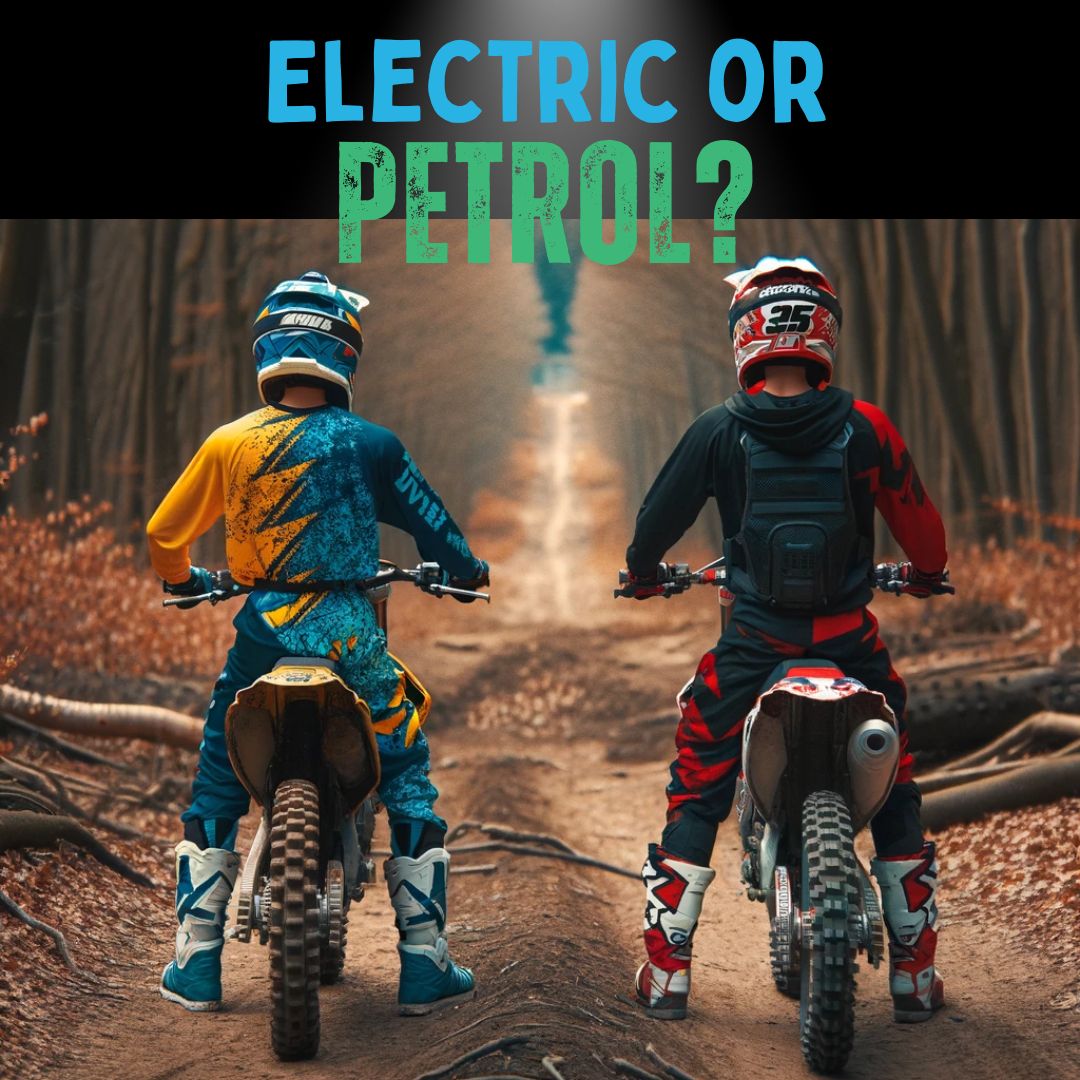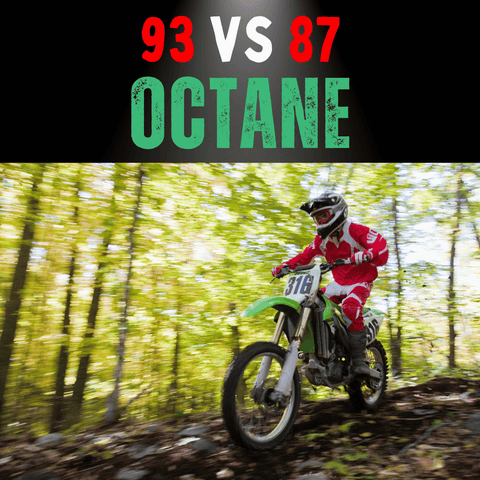
Published: 13.11.23
Updated: 21.6.24
Dirt biking, a thrilling blend of adventure and skill, is rapidly gaining popularity among enthusiasts of all ages.
Whether you're a seasoned rider eyeing the rugged trails or a parent considering a safe ride-on toy for your child, the choice between petrol and electric dirt bikes can be a pivotal one.
This article dives into the nuances of both types, offering insights to help you make an informed decision.
Petrol or Electric Dirt Bike: Making the Right Choice
| Feature | Petrol Dirt Bikes | Electric Dirt Bikes |
|---|---|---|
| Power and Speed | High power, fast speeds | Lower power, moderate speeds |
| Noise | Loud engine noise | Quiet operation |
| Maintenance | Regular maintenance required | Low maintenance |
| Environmental Impact | Higher emissions | Eco-friendly, no emissions |
| Cost | Lower initial cost, higher long-term cost | Higher initial cost, lower long-term cost |
Understanding Petrol Dirt Bikes
Petrol dirt bikes, often referred to as gas dirt bikes or gasoline bikes, are a traditional choice in the realm of off-road biking and motocross.
These bikes are celebrated for their power and speed, offering a raw and exhilarating dirt riding experience.
However, they are also known for being obnoxiously loud due to their combustion engine, a factor to consider for those sensitive to noise.
Petrol dirt bikes are known for their fuel efficiency, which is a key factor to consider when looking at long-term costs.
While petrol bikes may have higher maintenance requirements, their fuel efficiency can be a significant advantage, especially for riders who use their bikes frequently or for long distances.
However, fluctuations in fuel prices can impact the running costs.
Regular maintenance, including oil changes and engine servicing, also adds to the overall cost of owning a petrol dirt bike.
Related: What Size Dirt Bike Do You Need?
Who Should Choose Petrol Dirt Bikes?
These bikes are best suited for racers and enthusiasts who demand high performance.
Their ability to tackle rough terrains and achieve high speeds makes them a favourite in motocross events and rural settings.
Pros of petrol dirt bikes:
- Higher speeds; petrol bikes typically outpace their electric counterparts, making them ideal for racing and off-road adventures.
- Cost-effective upfront; generally, these bikes are more affordable initially, though they bring higher maintenance costs.
Petrol dirt bike cons:
- Maintenance costs; regular engine servicing can add up, impacting the long-term budget.
- Noise levels; the roar of a petrol engine might be music to some but can be a nuisance in noise-sensitive areas.
Related: What Kind of Petrol/Gas Does a Dirt Bike Take?
Exploring Electric Dirt Bikes
Electric dirt bikes, increasingly popular as an eco-friendly option, are making their mark in the world of electric motorcycle and e-bikes.
They are especially appealing to new riders and those looking for a beginner-friendly, easier to operate bike.
With fewer components, they are easier to move and control, making them a practical choice for a variety of riders.
The riding range and battery life are critical factors for electric dirt bikes.
Modern electric bikes offer impressive ranges, enough for most recreational riders.
However, for those planning longer rides or extensive use, it’s important to consider the bike's battery life and charging requirements.
Fast-charging capabilities and the option to carry spare batteries can alleviate range anxiety.
It's also worth noting that factors like riding style, terrain, and weight can influence the actual range of these bikes.
Ideal Riders for Electric Dirt Bikes
These bikes are particularly suited for new riders or those in urban settings where noise and emissions are concerns.
They're also excellent for young riders due to their ease of use.
Pros of electric dirt bikes:
- Instant torque and acceleration; electric bikes provide a swift response, making them fun and easy to handle.
- Lower long-term costs; with fewer maintenance needs, these bikes can be more economical over time.
- Quieter operation; electric bikes are significantly quieter, a big plus in residential areas.
Electric dirt bike cons:
- Higher Upfront Cost; the initial investment for electric bikes can be steep.
- Limited Top Speed; while quick off the mark, they may not reach the speeds petrol bikes can achieve.
Key Factors to Consider

When choosing between a petrol and electric dirt bike, considering the terrain you plan to ride on is crucial.
Petrol bikes, with their robust build and higher speed capabilities, are often preferred for challenging terrains like steep hills, rugged trails, and uneven surfaces.
Their power output and design make them suitable for adventurous rides in diverse environments.
Electric dirt bikes, while improving in this aspect, may still lag behind in extreme off-road conditions.
They are ideal for smoother trails, urban settings, and places where noise and emissions are a concern.
However, advancements in technology are rapidly closing this gap, making electric bikes more versatile.
Performance
In terms of performance parameters, petrol bikes, often referred to as gas-powered bikes, typically offer faster speeds and more robust handling, particularly on challenging terrains.
Electric bikes, while not always able to reach the max speed of their petrol counterparts, are catching up quickly thanks to technological advancements in bike technology.
Cost implications
While electric bikes have a higher purchase price, their lower maintenance costs can balance the scales in the long run.
| Consideration | Petrol Dirt Bikes | Electric Dirt Bikes |
|---|---|---|
| Initial Cost | Lower | Higher |
| Long-term Cost | Higher due to maintenance | Lower maintenance |
| Environmental Impact | Higher emissions | Eco-friendly |
| Noise Level | Loud | Quiet |
| Range | Refuel quickly | Depends on battery |
Noise considerations
In urban areas or communities with noise restrictions, the quiet nature of electric bikes is a significant advantage.
Environmental impact
The environmental impact of your choice cannot be overstated.
Electric dirt bikes, as an eco-friendly option, significantly reduce emissions and exhaust gases, aligning with the growing environmental awareness and eco-consciousness in societal trends.
Demographic considerations
Safety is paramount in dirt biking. Petrol bikes, with their high speeds and manual operation, might require more skill and experience to handle safely.
This makes them more suitable for experienced riders.
Electric dirt bikes, on the other hand, often feature simpler controls and smoother acceleration, making them more beginner-friendly.
They can be an excellent choice for those still learning the ropes of dirt biking, as well as for younger riders.
Lifestyle and practicality considerations
Your lifestyle and daily needs play a significant role in choosing the right dirt bike.
If you live in an urban area, an electric bike's quiet operation and eco-friendliness might be more practical.
They are also easier to store and transport, often requiring less space than petrol bikes.
For rural riders or those with access to wide-open spaces, petrol bikes might be more appealing.
They offer the freedom to tackle a variety of terrains without worrying about battery life.
For those who frequently travel with their dirt bike, consider the portability and ease of transport.
Electric dirt bikes are generally lighter and easier to handle, making them a convenient choice for those who need to load and unload their bike often.
In contrast, petrol bikes, while bulkier, offer the advantage of longer uninterrupted rides, which is ideal for those planning extensive trips in remote areas.
The ability to refill quickly at any petrol station is a practical benefit not to be overlooked.
Additionally, storage requirements differ significantly. Electric bikes, with fewer fluids and simpler mechanics, can be stored with less concern about leaks or complex preparation for long-term storage.
Petrol bikes, however, require more careful storage due to their combustible fuel and oil.
Technical Specifications: Understanding Dirt Bike Specs
When diving into the world of dirt bikes, it's crucial to understand the key specifications that define their performance.
Let's break down these important terms and features:
Engine Specifications
Torque: Torque is the rotational force produced by the engine. Think of it as the "grunt" that gets you moving.
- Measured in: pound-feet (lb-ft) or Newton-meters (Nm)
- Higher torque = Better acceleration and climbing ability, especially at lower RPMs
Horsepower: Horsepower represents the engine's overall power output.
- Measured in: brake horsepower (bhp) or metric horsepower (PS)
- Higher horsepower = Higher top speeds and quicker acceleration
Engine Displacement: This is the total volume of all the engine's cylinders.
- Measured in: cubic centimeters (cc)
- Larger displacement generally produces more power
Engine Types:
- 2-stroke engines:
- Simpler and lighter
- More power for their size
- Less fuel-efficient
- Higher emissions
- 4-stroke engines:
- More complex
- Smoother power delivery
- Better fuel efficiency
- Lower emissions
Suspension
Front Suspension: Typically uses telescopic forks. Key specs include:
- Travel: Distance the suspension can compress (in millimeters)
- Adjustability: Features like compression and rebound damping adjustment
Rear Suspension: Often uses a monoshock system. Important factors:
- Travel: Also measured in millimeters
- Linkage type: Affects suspension progressiveness
- Adjustability: Similar to front suspension
Other Important Specifications
- Seat Height: Measured from the ground to the top of the seat. Crucial for rider comfort and control.
- Wheelbase: Distance between the centers of the front and rear wheels. Affects stability and maneuverability.
- Ground Clearance: Distance from the lowest point of the bike to the ground. Important for off-road riding.
- Fuel Capacity: Impacts the bike's range between fill-ups.
Understanding these specifications is key to choosing a dirt bike that matches your skill level, riding style, and intended use.
Whether you're tackling tough trails or cruising smoother terrain, knowing your bike's specs will help you make the most of your riding experience.
Related: Should I Buy a Dirt Bike? The Essential Factors to Consider
Future Trends and Innovations
As dirt biking continues to evolve, staying informed about future trends and innovations is beneficial.
The electric bike market is rapidly advancing, with improvements in battery technology and motor efficiency.
These developments promise to make electric dirt bikes more competitive in terms of range, performance, and versatility.
On the petrol front, advancements are being made in fuel efficiency and emissions reduction.
This is especially relevant for riders concerned about their environmental footprint, as newer models are becoming more eco-friendly.
Keeping an eye on these trends will help you make a more future-proof decision, ensuring your dirt bike remains a valuable asset for years to come.
Community and Social aspect
The dirt biking community is a vibrant and diverse group, ranging from casual riders to professional racers.
When choosing between a petrol or electric dirt bike, consider the social aspects of your riding.
Petrol bikes, with their long history in the sport, have a large and established community.
This can be a valuable resource for learning, sharing experiences, and finding riding companions.
Electric dirt bikes, while newer to the scene, are growing in popularity and offer the chance to be part of an emerging community focused on innovation and sustainability.
Participating in this community can provide unique opportunities to engage with like-minded individuals and contribute to the growth of eco-friendly sports.
The social aspect of dirt biking is significant, whether you are riding a gas dirt bike, an electric dirt bike, or a gas-powered bike.
Each community offers unique experiences and perspectives, from the thrill of motocross on a gasoline bike to the emerging culture around electric motorcycle and e-bikes.
Engaging with these communities can enrich your dirt biking experience, offering insights into cultural shifts and environmental awareness.
Final Verdict
Wrapping up, the choice between a petrol and an electric dirt bike is influenced by your unique riding requirements and preferences.
If you're a speed enthusiast eager for competitive racing, a petrol (or gas) dirt bike, known for its faster speeds, might be your ideal choice.
On the other hand, electric dirt bikes, with their ease of use and safer speed limits, are more appropriate for beginners, children, or those who prefer a leisurely ride under 20mph.
Both petrol and electric bikes offer distinct advantages and cater to different aspects of dirt biking.
Factors such as performance, cost, noise levels, and environmental impact play a significant role in this decision.
Understanding these differences is crucial in selecting the right bike that matches your lifestyle and biking aspirations.
Remember, the perfect dirt bike for you depends on your individual riding style and circumstances.
There's no universal answer – it's all about finding the bike that resonates best with your personal needs and desires.
So, whether you choose petrol or electric, your decision paves the way for an exhilarating dirt biking journey.
Happy riding, and may your choice bring you the thrill and satisfaction you seek in your biking adventures!
FAQ's:
How does the performance of electric dirt bikes compare to petrol dirt bikes?
Petrol dirt bikes typically offer higher top speeds, with many models capable of exceeding 60mph, making them a preferred choice for speed enthusiasts and competitive racing. In contrast, electric dirt bikes generally have lower top speeds, often around 20 mph, although some advanced models can achieve significantly faster speeds. The specific performance capabilities will vary based on the model and design of the bike.
Can electric dirt bikes handle long rides as effectively as petrol dirt bikes?
Electric dirt bikes have made significant advancements in battery life and efficiency, making them more capable of handling longer rides than in the past. However, they still may not match the uninterrupted travel range of petrol bikes, which can easily refuel at any petrol station. Riders considering longer or more remote trips might find petrol bikes more suitable due to their extended range.
Are electric dirt bikes a more cost-effective option than petrol dirt bikes in the long run?
Electric dirt bikes are generally more cost-effective in the long run. They require less maintenance, do not need gasoline, and involve fewer expenses like oil changes. Although their initial purchase price can be higher, the long-term savings on fuel and maintenance can effectively offset these upfront costs, making them a financially prudent choice over time.
For urban riders, are electric dirt bikes a better choice than petrol dirt bikes?
In urban settings, electric dirt bikes are often preferred due to their quieter operation, which is advantageous in noise-sensitive areas. Additionally, their zero-emission nature makes them more environmentally friendly, aligning with urban eco-conscious values. However, petrol bikes might still appeal to those seeking higher performance and longer range within city outskirts.
Get in Touch 🚀
Loved our article on “Petrol or Electric? Which Dirt Bike is Better For You??” Got the itch to dive into more wheely-awesome info?
Whether you're a parent or a grandparent, we're here for all your kids ride-on toy questions! 🚗💨
Feeling click-happy?
Jump straight into our wonderland at RiiRoo.com.
Or, if you're more the chatty type, give our Live Chat a whirl and let's talk toys!








Share:
Things to Look for When Buying a Kids Ride on Car
Do You Need Insurance For Electric Scooters in 2025?